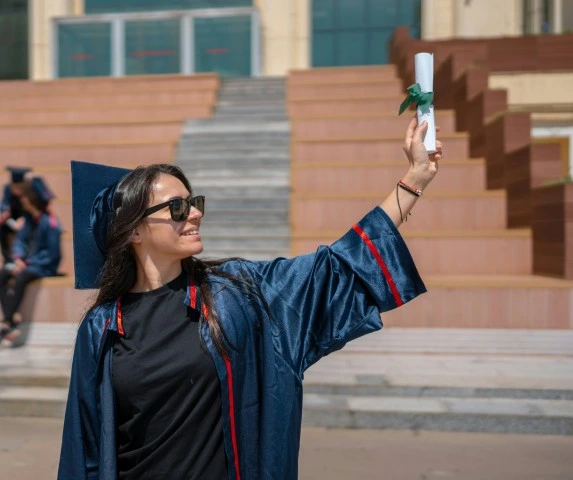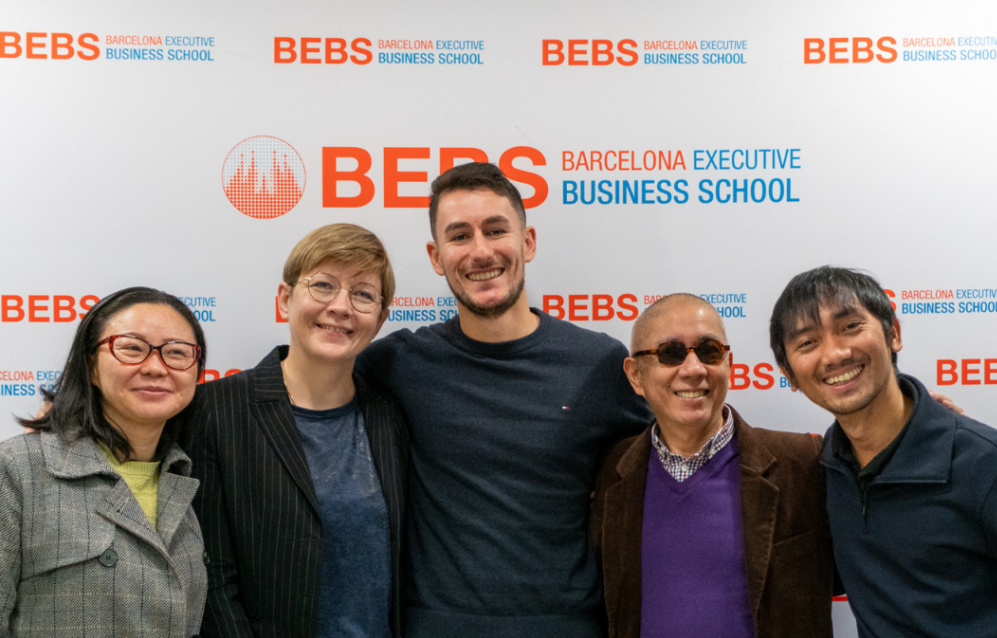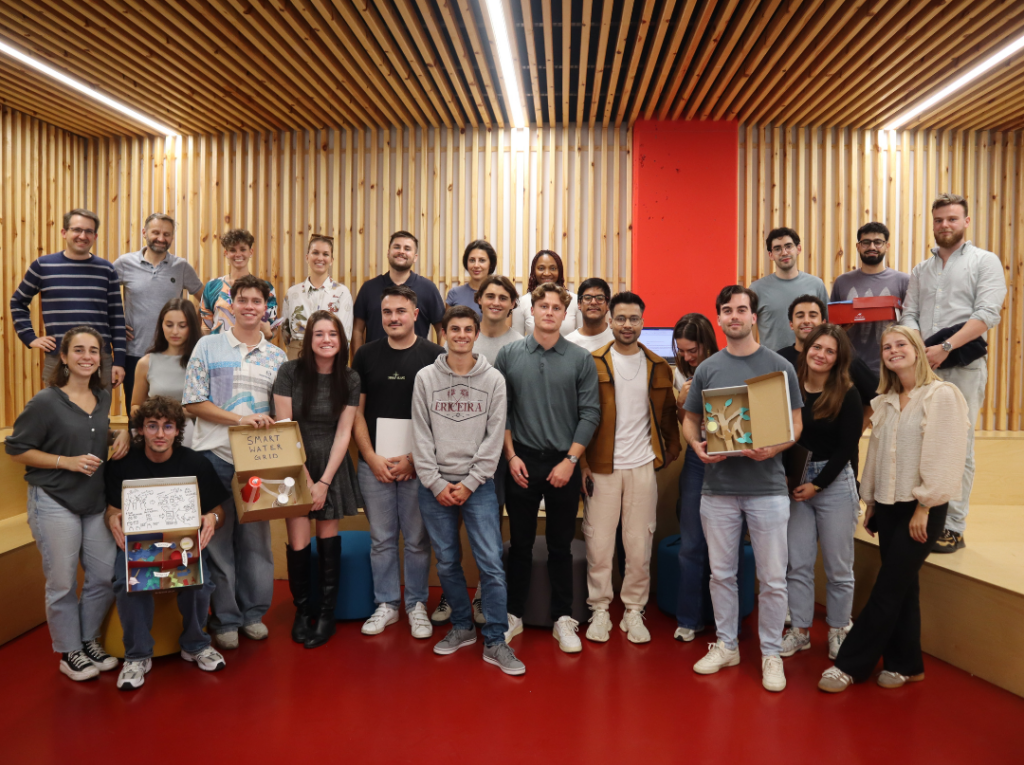
This program trains students in the most critical aspects of business management. Understand and refine your understanding of the tools needed in business creation and management through financial concepts, marketing and operations.
1x
Accreditation
Barcelona Executive Business School
Online
On Campus

Language
English or Spanish
English

Duration
6 Months
6 month

Credits
30 ETCS
30 ETCS

Acquire the skills and tools necessary to innovate and establish your own businesses with direct, practical, and effective training. Work with real-world cases, participate in company visits, and apply your newfound knowledge in practice.
1x
Accreditation
Barcelona Executive Business School
Online
On Campus

Language
English or Spanish
English

Duration
6 Months
6 Month

Credits
30 ETCS
30 ETCS

A focus on the managerial, technical and strategic aspects of the supply chain. Acquire the knowledge to address relevant issues in the industrial sector and devise modern solutions for the logistics and supply chain sector.
1x
Accreditation
Barcelona Executive Business School
Online
On Campus

Language
English
English

Duration
6 Months
6 Month

Credits
30 ETCS
30 ETCS

Project managers are highly sought-after professionals, as they organize and steer ideas towards business success. This postgraduate program has an excellent teaching staff made up of renowned project managers.
1x
Accreditation
Barcelona Executive Business School
Online
On Campus

Language
English or Spanish
English

Duration
6 Months
6 Month

Credits
30 ETCS
30 ETCS

Human resources are usually one of the most complex areas for companies to manage. The postgraduate in Leadership and Talent Management trains students in the skills of managing people and resources related to human capital.
1x
Accreditation
Barcelona Executive Business School
Online
On Campus

Language
English or Spanish
English

Duration
6 Months
6 Month

Credits
30 ETCS
30 ETCS

We prepare leaders and managers in the tourism and hospitality sector with the most relevant management training in just 6 months. This program targets key professionals; 1 out of every 10 jobs worldwide directly or indirectly relates to the sector.
1x
Accreditation
Barcelona Executive Business School
Online
On Campus

Language
English or Spanish
English

Duration
6 Months
6 Month

Credits
30 ETCS
30 ETCS

This master’s program teaches you the skills to analyze an organization’s operational performance in terms of production, distribution and international logistics. It provides you with the necessary tools and techniques to become an effective manager.
1x
Accreditation
Barcelona Executive Business School
Online
On Campus

Language
English or Spanish

Duration
12 Months

Credits
60 ETCS
ETCS

This master’s program will equip you to become a professional specializing in leading change initiatives aimed at boosting productivity and employee satisfaction within your organization. You will learn the latest practices and HR-specific analytics.
2x
Accreditation
Barcelona Executive Business School
Blackwell Global University
Online
On Campus

Language
English

Duration
12 Months

Credits
60 ETCS
ETCS

Take the next step in your professional journey in tourism. Learn cutting edge skills in technology and creative marketing from industry experts. Learn the tools to lead, innovate, and excel in the dynamic tourism industry.
2x
Accreditation
Barcelona Executive Business School
Universidad Católica de Murcia
Online
On Campus

Language
English

Duration
12 Months

Credits
60 ETCS
ETCS

This MBA is dual accredited. Gain practical and up-to-date training in a field that has changed significantly over the last decade with the MBA in International e-Supply Chain Management from BEBS. There’s a demand for professionals who can effectively manage the opportunities presented by emerging technologies
3x
Accreditation
Barcelona Executive Business School
Universidad Católica de Ávila
Blackwell Global University
Online
On Campus

Language
English or Spanish

Duration
12 Months

Credits
60 ETCS
ETCS

Human Resources (HR) plays a strategic role in every business. This MBA from BEBS empowers you to advance in your professional career and emerge as a leader in human resources by equipping you with the essential skills.
3x
Accreditation
Barcelona Executive Business School
Universidad Católica de Murcia
Blackwell Global University
Online
On Campus

Language
English or Spanish
English

Duration
12 Months
10 Months

Credits
60 ETCS
60 ETCS

The MBA in International Tourism and Hospitality Management from BEBS stands out for its disruptive approach compared to similar programs. Students not only gain insights into tourism and hospitality management but also delve into business management from a more innovative and multidisciplinary perspective.
3x
Accreditation
Barcelona Executive Business School
Universidad Católica de Murcia
Blackwell Global University
Online
On Campus

Language
English or Spanish
English

Duration
12 Months
10 Months

Credits
60 ETCS
60 ETCS

Gain the skills to effectively execute international projects, transforming ideas into tangible outcomes with the MBA in International Project Management from BEBS. Project management is essential for achieving measurable results and plays a critical role in business operations.
3x
Accreditation
Barcelona Executive Business School
Universidad Católica de Murcia
Blackwell Global University
Online
On Campus

Language
English or Spanish
English

Duration
12 Months
10 Months

Credits
60 ETCS
60 ETCS

This MBA is dual accredited. Gain practical and up-to-date training in a field that has changed significantly over the last decade with the MBA in Supply Chain and International Maritime Logistics from BEBS. There’s a demand for professionals who can effectively manage the opportunities presented by emerging technologies
3x
Accreditation
Barcelona Executive Business School
Universidad Católica de Ávila
Blackwell Global University
Online
On Campus

Language
English or Spanish
English

Duration
12 Months
10 Months

Credits
60 ETCS
60 ETCS

Get to understand today’s global business, with a focus on managing business innovation. Gain the skills and tools to innovate and create, at your current position or in your own business.
3x
Accreditation
Barcelona Executive Business School
Universidad Católica de Ávila
Blackwell Global University
Online
On Campus

Language
English or Spanish
English

Duration
12 Months
10 Months

Credits
60 ETCS
60 ETCS
Business Blog

May 6, 2025


When choosing a master’s program, it’s common to come across two types of degrees in Spain and across Europe: official master’s degrees and private (also known as university-specific or proprietary) master’s degrees. Both can offer high-quality education, but they serve different purposes, follow distinct accreditation processes, and come with different advantages. In this article, we’ll explain the key differences to help you make an informed decision. 1. What is an Official Master's Degree? An official master's degree is a program recognized by the Ministry of Education of the country where it is offered (in Spain, it’s the Ministry of Science, Innovation and Universities). It is aligned with the European Higher Education Area (EHEA) and meets the criteria of the Bologna Process, which ensures its automatic recognition in all EHEA countries. Key characteristics: Recognized throughout Europe. Grants access to doctoral studies. Valid for public sector job applications and official exams. Accredited by official agencies such as ANECA (in Spain). 2. What is a Private (University-Specific) Master's Degree? A private master's degree is a program designed by a university or business school to address specific labor market needs. Although it is not accredited by the Ministry, it is endorsed by the institution that delivers it. These programs tend to have a more practical focus, with updated content that reflects the real needs of the business world. Key characteristics: Focused on employability and business needs. More flexible and innovative in format and content. Does not directly grant access to a PhD program (although some may be validated). Issued by the university or educational institution itself. 3. Which One is Right for Me? It depends on your goals: Do you want to work in the public sector, pursue a PhD, or need a degree recognized throughout the EHEA? Then an official master’s degree is the right choice. Are you looking to enhance your professional profile, gain practical skills, or advance quickly in your career? A private master’s degree may be more suitable, especially if you value a strong connection with the job market. 4. What Does BEBS Offer? At BEBS, we combine high-quality education with a practical, market-oriented approach. Our programs offer dual certification: a private master’s degree issued by BEBS and the option to obtain an official degree endorsed by European universities such as the Catholic University of Murcia (UCAM), the Catholic University of Ávila (UCAV), or Blackwell Global University. If a student wishes to obtain the official degree, they must: Validate their studies with the corresponding university. Complete three additional subjects. Pay an academic fee of €1,900. There is no one-size-fits-all answer — the best choice depends on your personal and professional goals. What matters most is selecting a program that aligns with your career plan, provides real value, and is backed by a reputable institution. Not sure which type of master’s degree is right for you? Our academic team can help you decide. Get in touch with us!
Read More
May 6, 2025


Happy International Women’s Day! Today, 8th of March, BEBS wants to congratulate all women around the world for their contribution to society and support the efforts in favour of equality. And to celebrate this special day, we have interviewed Karelys Ramirez, the school’s Founder and General Director. We have talked with her to learn about the reasons that made her take the decision of becoming an entrepreneur, or the obstacles that were put in front of her because of being a woman in such a male-dominated field such as business. Read the entire interview below. Tell us briefly about your story. Who is Karelys Ramirez? How did you become an entrepreneur? Karelys Ramirez is an optimist, honest and happy person that likes to travel, establish relations with different people and learn. Someone that doesn’t judge anyone and discovered when she was 30 that wanted to be an entrepreneur. I studied Business at Universitat Autònoma de Barcelona and did a Master’s in Finances at UAB as well. I worked for five years in the Master’s Program, Marketing, Commerce and Distribution of UAB as Deputy Director of University Wellbeing and Operations. But even though my work at UAB was good and stable, I needed to do something more. And I realized that what I wanted was to be an entrepreneur, so I decided to do it. And now we are here, after having founded Barcelona Executive Business School almost seven years ago. When and how did you decide to create your own Business School? I was still a UAB employee when I decided to create BEBS. I started working on the project while I was working there because I could not leave my job. When I was ready, I left to start my own entrepreneurship adventure. Being very aware that I could be successful, but also knowing that things could go wrong, I decided that I was ready for it. How would you describe your working method to direct a company? I think that you need to be happy at work because in the end, it’s your second home. You just need to count how many hours a day we spend working. That is the reason why I like to give my team flexibility responsibly, I appreciate multiculturalism as something enriching, and I encourage teamwork and mutual trust. Which are the biggest challenges that you have had to deal with because of being a woman entrepreneur? I would not call them challenges but curiosities, as I have never been stopped, but I have to admit that there is a lot of sexism in the world of entrepreneurship. This field is advancing, but we still have a lot of work to be done. For instance, when they see a woman like me, the first thought of many people is that someone has built a business for us. They never think that we can be founders and that we have the ability to build a business “alone”. Even though I say “alone”, I have always tried to be surrounded by good people and listen to the advice of those who have believed in me and appreciate me. I have accepted the help of everyone that has offered me their help. And without all those people, I would not have gotten where I am now. In the end, being undervalued just because you are a woman is the first barrier or challenge that you need to overcome to be successful in the world of entrepreneurship. How have you dealt with those challenges? I have dealt with them with optimism and sportsmanship because on many occasions I have taken advantage of being undervalued to get information and then make the right choices. For instance, men used to tell me to speak to my boss about business ideas because they did not believe that I was the owner of the school. In the end, those people were giving me more information than they should, so I got an advantage to decide. Most managers at BEBS are women. And there are more women than men working in the school. How do you think that differentiates BEBS from other businesses? I believe in talent. I do not think if that talent comes from a man or a woman. But the truth is that BEBS, by having so many women managing, is a school with different values. Like the humanist approach to business or the importance of collaborative work to obtain results. Which people -or women- have inspired you during your journey making BEBS grow? I have not had one unique role model, but I have been inspired by a lot of people around me. Men and women that for me have been examples both of good and bad situations. I am not someone that uses every piece of advice I am given, but I usually take something from them. Always adjusting that advice to my principles, values, and ways to see the world. How did you envision BEBS during the first steps of the school? Are you proud of what BEBS is now? I have always been imagining BEBS as it grew because I have taken every step at a time, even stopping everything when needed. But I am really proud of what BEBS is today and the people that work and collaborate at the school. I am proud of how we are managing the school and the values that we are sharing internally with our team and externally with our students and professors. How do you want BEBS to influence women to feel empowered in the business world? The fact that in BEBS most of the managers are women is a coincidence that has happened by choosing talent over anything else. But since this is the situation we are in, I’d love for BEBS to be an example of a leader school led by businesswomen. And not only that, it is a group of women that are, in most cases, moms that are efficient with their personal and professional life at the same time. Because who says that it is incompatible to be a woman, mother, director, and entrepreneur? What advice would you give to women who are aspiring entrepreneurs? I encourage every woman that wants to be an entrepreneur to do it because we do not have limits. Limits are a lot of times created by ourselves, because of the way society works, perpetuating an old way of thinking. Everything can be done, it is a hard road, but a gratifying one.
Read More
May 6, 2025


Barcelona Executive Business School offers high-level training programmes with a practical model focused on resolving day-to-day issues in the classroom. The Postgraduate in Project Management is a great example of this study methodology. Thanks to a team of professors who are active professionals in the field of project management, students get an accurate picture of the current demands and trends in the sector. They have the opportunity to train with professionals with years of experience and knowledge who provide them with real case scenarios. This postgraduate course in project management is an excellent opportunity to acquire practical and up-to-date training based on the real business world. If you are thinking about enrolling in this programme, now is the perfect opportunity. BEBS has launched a new Scholarship Scheme for the Postgraduate in Project Management which can mean up to 20% discount on the tuition fee. The scholarship is available to any new student who wants to enrol in BEBS and who applies before 31 December 2022, either in on campus or online modality. Become a successful business planner Developing project management skills is essential for any professional responsible for managing teams, large or small. Managers need to make quick decisions in unpredictable scenarios and project management skills allow them to define and create good plans and execute them correctly. This postgraduate course in project management creates professionals who are sufficiently skilled to perform in today’s hyper-competitive and globalised environments. Using this knowledge, students become effective facilitators of the objectives of any project that may come their way. The programme is based on a practical methodology focused on fostering and encouraging teamwork, problem solving, critical thinking and collaboration. Who is this programme for? BEBS Postgraduate in Project Management is a programme designed for professionals who are developing their careers as project managers and want to improve their knowledge and skills in the area in order to advance their careers. In this postgraduate course you can find different types of profiles. The contents of the programme are useful for company directors or managers who want to update their project management skills with the latest trends in the field, but also for recent graduates who are trying to start their way through new career opportunities in this strategic sector. Since the position of project manager is not closed to any industry, BEBS Postgraduate in Project Management is a great option for professionals from any sector who work directly with projects. Upon completion of this programme, students will be able to work in positions such as Project Manager, Program Manager, Delivery Manager or Project Officer Manager. Students are trained with a global, integrated and strategic vision of any company. How is this achieved? As mentioned above, the key element of this programme is that the lecturers are working professionals with years of experience as project managers. The classes are not just about the theoretical framework, but how it is applied in today’s business scenario. The professors teach through their own learning and experiences. Sharing that reality with students to give them a much more realistic picture of what they will encounter once they finish the programme and start the next phase of their professional careers. Each module of the BEBS Postgraduate in Project Management has a case study. The lecturers bring to the classroom real examples of situations faced by companies today. After learning about the context, students are challenged to find a solution to these dilemmas and share it with the rest of their classmates. What better way to learn how to act at crucial moments than to actually do it? This practical mindset is one of the core values of BEBS and will prepare you to face any challenge. Open yourself to the international scene BEBS is a business school proud of its diversity. Throughout our history, students from over 120 different countries have chosen to study with us, either on campus or online. Joining BEBS gives you the opportunity to open yourself up to a wide range of international connections. During the Postgraduate in Project Management, you will share the classroom with professionals from all continents. As a result, you will learn how project management is approached around the world and use this knowledge for your international career. It is an excellent opportunity to foster new friendships and career opportunities at the same time. This programme can be your first step towards a new career that will take you much further than you ever imagined. Learn the fundamentals of project management and entrepreneurship You will start the Postgraduate in Project Management course with the module ‘Entrepreneurship & Innovation’, where you will learn essential ideas to develop an entrepreneurial mindset and become a disruptive innovator. The classes will train you on how to build a business plan from scratch, the business model of a start-up or the financial evaluation of new projects. In the ‘Project Management Fundamentals’ module you will learn the basics of project management: fundamental concepts, different approaches, budget planning and control, initial financial decisions needed to launch a project and stakeholder analysis, among other important aspects. And in the module ‘Project Planning’ you will be trained in the planning processes of the Project Management Body of Knowledge. Commonly known as PMBOK, this is a collection of processes, best practices and guidelines that are considered standard in the field of project management. Develop your project management skills Once you have completed these first training blocks, the ‘Project Execution’ module is designed to instruct you in the process of executing any project, such as the organisational aspects that need to be taken into account, the management skills on site, or the strategies and negotiation techniques that are needed. The ‘Critical Chain Project Management’ module teaches students the planning and management method that analyses the resources required to perform the tasks necessary to execute any project. People, equipment, resources, physical spaces, etc. At the end of this course, students will be able to perfectly manage this basic chain. As a project manager, you will also have to acquire your own working method. That is why the last module of this postgraduate course is ‘Project Management Tools and Techniques’. If you haven’t heard of techniques such as Agile or Scrum, you will learn about them here. The same with Capability Maturity Model Integration or CMMI, a model designed to update and evaluate the development of systems. Now that you know most of the details about the Postgraduate in Project Management and the new Scholarship Plan, do you want to know more about the programme? You can find all the details about this postgraduate on our website, contact our team of Student Advisors and get all the advice you need.
Read More
May 6, 2025


BEBS was honored to host Audrey Leibfried, Henkel’s Global Purchasing Manager, Thermal Management & Metals, for an engaging session that combined insights into Henkel’s innovative business strategies and exciting recruitment opportunities for our students. This initiative was a collaborative effort with Consultancy Business Agency (CBA), who played a key role in coordinating the session and providing inputs in today’s inovation challenges. Henkel: A Global Leader Henkel, with 147 years of innovation, is a global leader in adhesive technologies and consumer goods, spanning laundry care, home care, and beauty products. Their impact is immense: every second, 20 people use Henkel’s Schwarzkopf hair products, and 25 billion laundry loads are cleaned annually with their detergents. Committed to sustainability, Henkel has reduced CO2 emissions by 61% and incorporates 19% recycled plastic into its consumer packaging. Building the Bridge Between Industry and Academia At BEBS, we pride ourselves on creating platforms where students can engage directly with industry leaders: Henkel’s visit to BEBS showcased how academic institutions and global leaders can work together to drive meaningful change. Students gained firsthand insights into Henkel’s sustainable practices and cutting-edge technologies while exploring career opportunities within a company recognized for its innovation.
Read More
May 6, 2025


We are excited to reflect on a remarkable initiative that brought together Barcelona Executive Business School (BEBS) students in a unique collaboration with Universitat Politècnica de Catalunya (UPC), as part of a European Commission initiative aimed at fostering innovation and entrepreneurship for long-term solutions. This EU-supported Moonshot Project provided a platform for BEBS students to participate in a challenge that went beyond technical expertise—it was about creativity, vision, and ambition. The Consultancy Business Agency (CBA) played an important role in establishing the partnership and shaping the ecosystem, actively contributing to the development of projects alongside the participants from a business perspective. Their guidance ensured the ideas were not only innovative but also grounded in real-world feasibility and market readiness. Moonshot Thinking Professor Andreas Sumper, responsible for the Smart Energy and Networks research group at UPC and of the Master Energy for Smart Cities at EIT InnoEnergy, defines Moonshot Thinking as a radical approach to innovation that seeks to address major global challenges by aiming for transformative, often seemingly impossible, solutions. Rather than focusing on incremental progress, Moonshot Thinking encourages bold, visionary goals that push the boundaries of what is currently feasible. This methodology involves setting bold, ambitious goals that aim for significant societal impact. It emphasizes interdisciplinary collaboration, bringing together diverse expertise to spark creativity and discover innovative solutions. Additionally, this approach encourages risk-taking and experimentation, recognizing that uncertainty and potential failure are integral to achieving breakthroughs that can transform industries and tackle pressing challenges like climate change, energy, and infrastructure. For Professor Sumper, Moonshot Thinking is not just about solving technical problems but is deeply tied to motivating people to push beyond conventional limits and explore visionary solutions, often leading to technological and social transformation. Project Highlights The Moonshot Project involved the application of advanced tools such as the 4 Horizons Tool and the Opportunity Map to evaluate the potential of each idea. BEBS and UPC students collaborated to push the boundaries of what’s possible, generating bold “What if…?” questions and turning them into actionable solutions. The Moonshot Project yielded four innovative initiatives aimed at addressing critical global challenges: First, a satellite designed to capture solar energy offers a novel approach to harnessing renewable power from space. Second, robots for waste collection in underserved areas not only recycle materials but also reduce reliance on raw material extraction. Third, the Smart Water Grid empowers individuals to generate their own water, enabling them to sell surplus, akin to solar energy systems. Lastly, artificial trees serve as eco-friendly replacements for street electrical grids, generating energy through their leaves to provide municipalities with a zero-cost lighting solution, thereby transforming urban infrastructure. Engineers (UPC) and Business Participants (BEBS) solving long – term challenges Key Project Days October 22, 2024: Kick off the project, working closely with UPC students to brainstorm and develop their ideas. October 29, 2024: Follow-up session at UPC, further refining these concepts. December 10, 2024:A final hands-on workshop at FABLAB, where BEBS and UPC students will collaborate to create prototypes for their visionary projects The Outcome The Moonshot Project provides the students real-world experience in innovation, design thinking, and prototyping. This initiative underscored the power of collaboration, creativity, and the diverse, international student community at BEBS &UPC. Through their dedication and innovation, the students delivered solutions with the potential to create lasting change in energy, water management, and sustainable development.
Read More
May 6, 2025


Barcelona Executive Business School (BEBS) is proud to partner with some of the most prestigious universities in Spain. Our collaboration with institutions like Universidad Católica de Murcia (UCAM) and Universidad Católica de Ávila (UCAV) allows us to offer our students access to world-class education and a global network of opportunities. Recently, both UCAM and UCAV have been featured in the prestigious Forbes ranking of Spain’s best universities. The ranking recognizes the strong international focus, personalized teaching model, innovation, and commitment to quality education. Forbes highlighted the universities’ successful alumni, who hold prominent positions in various fields. What Makes These Universities Stand Out? To compile this ranking, Forbes convened an international committee of higher education experts who evaluated universities across these five key areas: Accessibility and inclusivity: The committee evaluated universities based on the availability of scholarships, financial aid, and support services for students with special needs. Job placement and internships: The committee placed significant emphasis on how well universities prepare students for the workforce and the quality of their internship programs. Alumni achievements: The success of graduates in their respective fields was another crucial factor in the evaluation. Teaching and research quality: The caliber of faculty and the strength of research programs were also considered. International outlook: Universities were assessed on their international student population, faculty, and research collaborations. Students from +130 nationalities Collaboration and partnership with UCAM and UCAV Through collaboration with esteemed Spanish universities such as Universidad Católica de Murcia and Universidad Católica de Ávila, BEBS provides its students with an unparalleled learning opportunity that blends demanding academic curriculum with hands-on, real-world experience.The steadfast dedication of these universities to quality, globalization, and student achievement is consistent with BEBS’s own principles and objectives. UCAM and UCAV have received noteworthy acknowledgement for their outstanding accomplishments. Both universities have been ranked among the best in the world by THE’s Impact Ranking, which evaluates excellent education that provides students the abilities and knowledge required to thrive in today’s global job market. Through this collaboration, BEBS students gain access to the combined knowledge and assets of these esteemed organizations, giving them a competitive advantage in the global employment market.
Read More
April 16, 2025


What can leaders and entrepreneurs learn from this holiday? Every April 23rd, the streets of Barcelona bloom with books, roses and a contagious sense of celebration. But beyond romance and tradition, there’s something else going on—something many overlook: Sant Jordi can also be a day full of inspiration for entrepreneurs, creatives and globally minded professionals. At BEBS, we invite you to see this beloved Catalan festival from a different angle—through the lens of innovation, cultural exchange, and authentic networking. Reinventing Tradition: When the Old Sparks the New The story of Sant Jordi—a brave knight, a dragon, and a magical rose—has been retold for generations. But each year, it finds new life: in graphic novels, street performances, creative merchandise, marketing campaigns, and even NFT collections inspired by the legend. One great example: “Sant Jordi in pajamas”, a virtual book fair born during the pandemic that took over Instagram and helped self-published authors and indie publishers stay connected with readers. Sometimes, innovation doesn’t mean starting from scratch—it means reimagining the familiar with fresh eyes. A Festival of Cultures: When Creativity Becomes Global Sant Jordi is deeply rooted in Catalan tradition, but its spirit is truly global. Every year, publishers release books in multiple languages, international authors sign copies for fans, and cultural institutions organize activities in Japanese, Arabic, Portuguese and more. Some community-driven events even blend literature with food, music and crafts, celebrating Barcelona’s vibrant multicultural identity. Creative ideas thrive when diverse voices share the same stage. Authentic Networking: Where Connections Just Happen Forget formal events with name tags—on Sant Jordi, connections happen organically. Writers and readers chat while waiting in line for signings. Illustrators meet authors they might collaborate with. Book lovers discover startups showcasing creative tools or digital storytelling apps. A real case: “Books that Heal”, a social project connecting therapists, indie bookstores and publishers to recommend therapeutic reading lists, began with a simple street conversation on Sant Jordi. When people gather around ideas they love, genuine networking happens naturally. A City in Creative Mode: Discovering Barcelona Through a New Lens Sant Jordi is also the perfect opportunity to explore the city in its most creative and vibrant form. From alternative book fairs in El Raval to literary cafés in Gràcia, Barcelona becomes a living map of innovation and culture. Places like Fabra i Coats or Palo Alto Market often host special Sant Jordi events that combine literature, design, tech, and entrepreneurship in one space. To walk the city during Sant Jordi is to explore the creative soul of Barcelona—one that draws students, entrepreneurs and dreamers from all over the world. What If You Could Experience the Next Sant Jordi From the Inside? At BEBS, we believe that becoming a leader doesn’t only happen in the classroom. It also happens on the streets, in creative environments, and in moments of spontaneous connection. What if your next step in business or leadership brought you to a city that celebrates culture, creativity and diversity all in one day? If you are thinking of studying in Barcelona and are looking for a business school with a modern, international, and entrepreneurial outlook... 👉 Explore our International MBA's and Postgraduate Programs in Barcelona and Online
Read More
March 20, 2025


In 2025, the words “green talent” are gaining importance in the corporate environment. We have moved from talking about “green companies” and “responsible organizations” to focusing on individuals with sustainable values. Before purchasing a product, we make sure that the brand adds value to society, considering its impact on sustainability and climate change. • Did you know that companies are now looking for people with those same values? Not only do they get paid to have them, but they actively seek them out. Green talent refers to people who possess skills, knowledge, and values that allow them to implement sustainable practices and protect the environment. These skills are critical for companies to adapt to current environmental challenges and maintain their competitiveness in a market increasingly focused on sustainability. • What skills should a green talent have? Competencies include capabilities to prevent, monitor, or reduce pollution, as well as to optimize the use of natural resources in the production of goods and services. The demand for professionals with these skills is constantly increasing due to the transition to a sustainable economy, which has led to a significant increase in job offers that require green skills. “A green talent is 76% more likely to be hired. (LinkedIn Green Skills 2024)” • What are the job opportunities in sustainability? Jobs linked to sustainability could grow by up to 40% in the coming years, especially in areas such as renewable energy, waste management and environmental consulting. The Corporate Sustainability Due Diligence Directive (CSDDD) will encourage the recruitment of partners with studies in this sector. People with master’s degrees, MBAs and other studies will stand out in the selection processes. • What opportunities to specialize? Someone studying Supply Chain or Operations Management and Logistics can take the opportunity to specialize in sustainable supply chain management, aligning with emerging regulations and helping companies meet social and environmental expectations. This directive represents both a challenge and a great professional opportunity for those interested in working in areas such as risk management, traceability, supply chain optimization, corporate sustainability and innovation. • What is the trend of the future? The trend for the coming years is to consolidate the integration of sustainability into the strategy of companies and to make progress in generating positive social and environmental impact. This is not only an obligation, but an opportunity for companies and individuals to contribute to a more sustainable future. “Green talent” is growing significantly due to the transition towards a more sustainable economy. Companies are increasingly seeking individuals with skills and values oriented towards sustainability, and these competencies are essential to face current environmental challenges. Furthermore, job opportunities in sustainability-related areas are on the rise, and specializing in these fields, such as sustainable supply chain management or environmental consulting, represents an excellent professional opportunity. In the future, the integration of sustainability into business strategies will solidify, creating both challenges and opportunities to contribute to a more sustainable future.
Read More
July 15, 2021


With 195 countries in the world, choosing where to study abroad can feel overwhelming. To make your decision easier, we’ve created our top ten countries for international students, highlighting education quality, lifestyle, cultural opportunities, and career prospects. Benefits of Studying Abroad Studying abroad is more than an academic experience; it’s a life-changing opportunity. Research consistently shows the impact: Maturity and independence: 95% of students reported increased maturity after studying abroad. Self-confidence: 96% felt more confident navigating new environments. Global perspective: 95% acknowledged lasting changes in worldview. Programs like Erasmus+ (established in 1987) illustrate the personal and social benefits. A European Commission study shows that Erasmus alumni are more likely to have international relationships, with an estimated 1 million babies born to Erasmus couples since 1987. Moreover, international experience boosts employability. Employers value multilingual candidates with cross-cultural skills and global networks essential in today’s interconnected job market. 10 Best Countries to Study Abroad 1. United Kingdom The UK hosts some of the world’s most prestigious universities. Oxford, Cambridge, and the London School of Economics consistently rank at the top. London offers a truly international environment, home to over 270 nationalities and 300 languages. Smaller cities like Manchester, Edinburgh, or Brighton also provide vibrant academic communities. Note: Brexit has slightly affected the international student environment, but UK universities remain highly attractive globally. 2. Germany Germany offers high-quality education with little to no tuition fees, making it ideal for cost-conscious students. Cities like Berlin and Hamburg are cultural hubs, offering dynamic lifestyles. Employment rates are strong (unemployment around 4.5%), though sunny weather is limited. Germany’s central location in Europe also allows easy travel across the continent. 3. Spain Spain combines culture, climate, and innovation. Barcelona and Madrid are innovation hubs, ranking among Europe’s top cities for startups. Spain is ideal for students who want to launch their careers while enjoying Mediterranean life. Spanish universities also emphasize internationalization, making it easier for students to integrate. 4. Canada Canada is renowned for high-quality universities and welcoming multiculturalism. 1 in 5 residents is foreign-born. Cities like Toronto and Vancouver offer a mix of urban life and nature, providing an excellent environment for both study and personal growth. 5. South Korea South Korea attracts students for its high-quality education and technology-driven environment. Seoul and Busan are cultural and academic hubs. While numbers fluctuated during the pandemic, the country remains a top destination for STEM and social science programs. 6. New Zealand Famous for its stunning landscapes, New Zealand combines academic quality, safety, and lifestyle. Universities like the University of Auckland and Victoria University of Wellington rank well globally. Cities like Auckland are consistently named among the world’s most liveable cities, offering a balance of study and outdoor activities. 7. Mexico Mexico is a top choice for Latin American students and international learners seeking cultural immersion and historical richness. The Universidad Nacional Autónoma de México (UNAM) is a UNESCO World Heritage site and among the top 100 universities in Latin America. Students enjoy a vibrant culture, festivals like Día de los Muertos, and renowned cuisine. 8. South Africa South Africa combines academic opportunities, economic growth, and natural beauty. Cities like Cape Town, Pretoria, and Johannesburg host top universities. The country is developing technology and innovation hubs, attracting students interested in entrepreneurship and emerging markets. 9. Singapore Singapore is a global innovation and smart-city hub. English is widely spoken, making it easy for international students to communicate and integrate. Singapore is also culturally diverse and technologically advanced, offering excellent career prospects in finance, STEM, and business fields. 10. Japan Japan is a top destination for students in STEM and technology, with a strong focus on digitization and innovation. Beyond academics, Japan offers unique cultural experiences, world-class cuisine, and renowned hospitality. Cities like Tokyo and Kyoto provide vibrant student life combined with safety and cutting-edge infrastructure. Our Recommendation: Spain While all ten countries are excellent options, Spain stands out for combining international education, career opportunities, innovation, and lifestyle. Barcelona and Madrid provide dynamic start-up environments, Mediterranean weather, and a welcoming culture for foreigners. Studying in Spain allows students to develop professionally while enjoying life to the fullest. Ready to Study Abroad? Choosing a country is just the first step. At BEBS Barcelona Executive Business School, we help students make the most of their international education, offering guidance on programs, visas, and career opportunities. 📧 Contact us at info@bebs.org and start planning your global journey today!
Read More